Related Research Articles
Seven ships of the Royal Navy have been named HMS Invincible.
Fifteen ships of the Royal Navy have been named HMS Enterprise while another was planned:

The Royal Fleet Auxiliary (RFA) is a naval auxiliary fleet owned by the UK's Ministry of Defence. It provides vital logistical and operational support to the Royal Navy and Royal Marines. The RFA ensures the Royal Navy is supplied and supported by providing fuel and stores through replenishment at sea, transporting Royal Marines and British Army personnel, providing medical care and transporting equipment and essentials around the world. In addition the RFA acts independently providing humanitarian aid, counter piracy and counter narcotic patrols together with assisting the Royal Navy in preventing conflict and securing international trade. They are a uniformed civilian branch of the Royal Navy staffed by British merchant sailors.

RFA Diligence was a forward repair ship of the Royal Fleet Auxiliary. Launched in 1981 as a support ship for North Sea oil rigs, she was chartered by the British government to support naval activities during the 1982 Falklands War and was later bought outright as a fleet maintenance vessel. She gave assistance to the damaged USS Tripoli and Princeton in the 1991 Gulf War, and to Sri Lanka after the 2005 tsunami. She typically had deployments of 5-8 years in support of the Trafalgar-class submarine on duty east of Suez, with a secondary role as a mothership for British and US minesweepers in the Persian Gulf. Until 2016 Diligence was set to go out of service in 2020. However in August 2016, the UK Ministry of Defence placed an advert for the sale of RFA Diligence. As of 2016 the option for the delivery of future operational maintenance and repair capability for the RFA remained under consideration. However, the 2021 British defence white paper made no specific mention of the need for this capability.
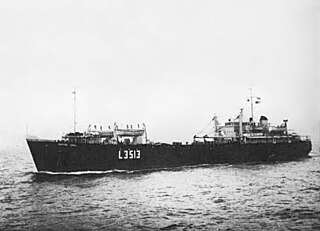
RFA Empire Gull (L3513) was a landing ship, tank of the Royal Fleet Auxiliary. She was familiarly known as the "Black Pig" and was one of the last serving British LSTs. She was built as LST 3523, one of the Empire Ships, and later commissioned as HMS Trouncer. During the Suez Crisis she was pressed into Government service as SS Empire Gull. In 1970 she was transferred to the Royal Fleet Auxiliary as RFA Empire Gull, serving for ten years before being scrapped.
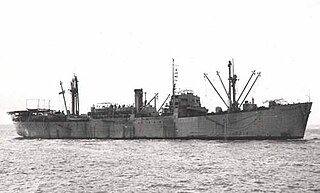
RFA Fort Duquesne (A229) was an air stores ship of the Royal Fleet Auxiliary a Fort type ship.

HMAS Supply was a Tide-class replenishment oiler of the Royal Fleet Auxiliary (RFA) and the Royal Australian Navy (RAN). Originally named Tide Austral and intended to be the first ship of a post-World War II Royal Australian Fleet Auxiliary, manpower and financial shortages meant that when the Belfast-built ship was launched in 1955, she could not be accepted into Australian service. Instead, she was loaned to the RFA, operating RFA Tide Austral (A99). In August 1962, the ship was commissioned directly into the RAN, then renamed a month later to HMAS Supply. Supply operated as part of the RAN until her decommissioning at the end of 1985.
Nine ships of the Royal Navy and one of the Royal Fleet Auxiliary have been named Argus, after Argus, the hundred-eyed giant of mythology:
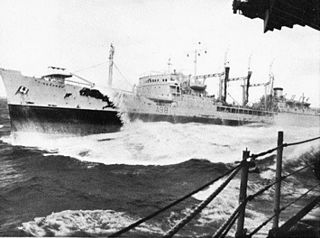
The Tide class was a series of six replenishment oilers used by the British Royal Fleet Auxiliary (RFA), the Royal Australian Navy (RAN), and the Chilean Navy.

USS Yuma (AT-94/ATF-94/T-ATF-94) was a Navajo-class fleet tugboat constructed for the United States Navy during World War II. She was the second U.S. Navy ship named for the Yuma tribe of Arizona.

RFA Maine was a hospital ship of the British Royal Fleet Auxiliary, which served during the Second Boer War, up until the eve of World War I.
RFA Maine was a hospital ship of the British Royal Fleet Auxiliary, that served during World War I.
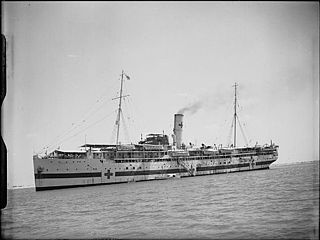
Royal Fleet Auxiliary ship Maine was a hospital ship of the British Royal Fleet Auxiliary, that served during the First World War and the Second World War.
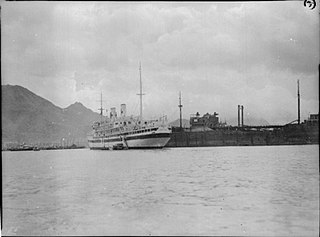
RFA Maine was a 7,432 GRT hospital ship which was built in 1924 as the ocean liner Leonardo da Vinci by SA Ansaldo, La Spezia, Italy for the Società di Navigazione Transatlantica Italiana. In 1941, she was captured by the British at Kismayu, Italian Somaliland. Declared a prize of war, she was passed to the Ministry of War Transport (MoWT) and renamed Empire Clyde, serving as a hospital ship for the British Army during the Second World War. In 1948, ownership was passed to the Admiralty and she entered service with the Royal Fleet Auxiliary as RFA Maine. She served during the Korean War and was scrapped in 1954.
A number of ships of the Royal Navy have borne the name HMS Diligence.
SS Panama may relate to the following ships;

Polar Chief was an 8,040 GRT tanker which was built in 1897 as the cargo ship Montcalm. In 1914 she was requisitioned by the Admiralty, serving initially as a troopship. In October 1914, she was converted to a dummy battleship and renamed HMS Audacious. In 1915 she became a depot ship, followed by conversion to a tanker in 1916 when she was sold into Royal Fleet Auxiliary service and renamed RFA Crenella. In 1917, she survived a torpedo attack off the coast of Ireland. In 1919, she was sold into merchant service as SS Crenella.
RRS Discovery II was a British Royal Research Ship which, during her operational lifetime of about 30 years, carried out considerable hydrographical and marine biological survey work in Antarctic waters and the Southern Ocean in the course of the Discovery Investigations research program. Built in Port Glasgow, launched in 1928 and completed in 1929, she was the first purpose-built oceanographic research vessel and was named after Robert Falcon Scott's 1901 ship, RRS Discovery.
Several ships of the Royal Navy have been named HMS Industry.
References
- ↑ "Hospital Ship Order Cancelled". The Times (52362). London. 12 July 1952. col F, p. 4.